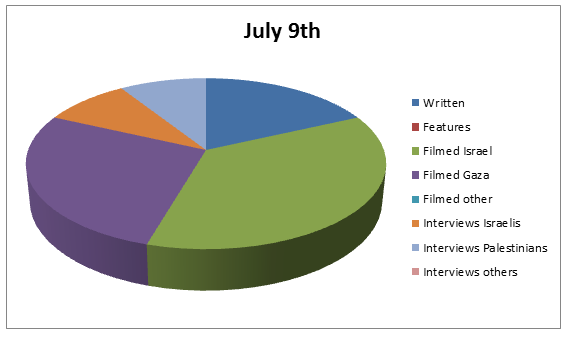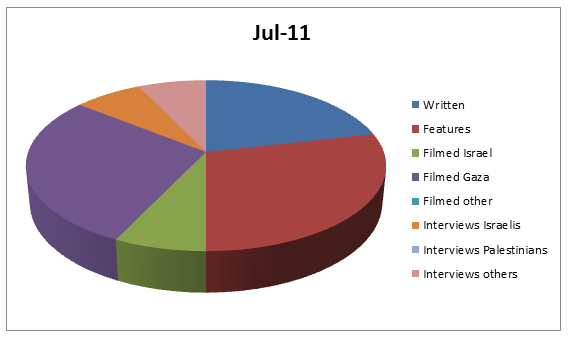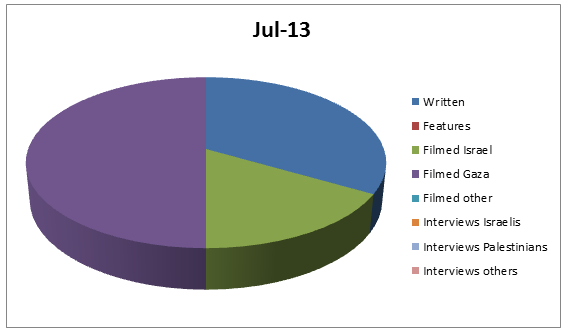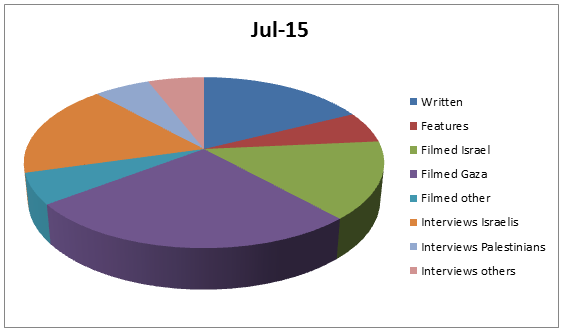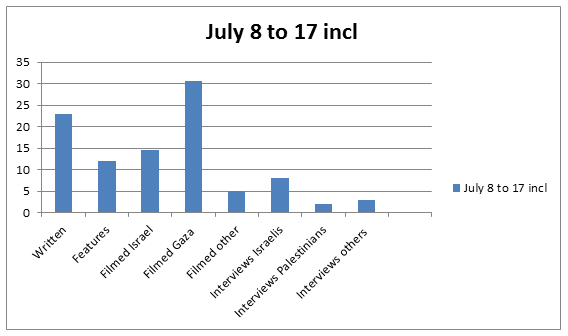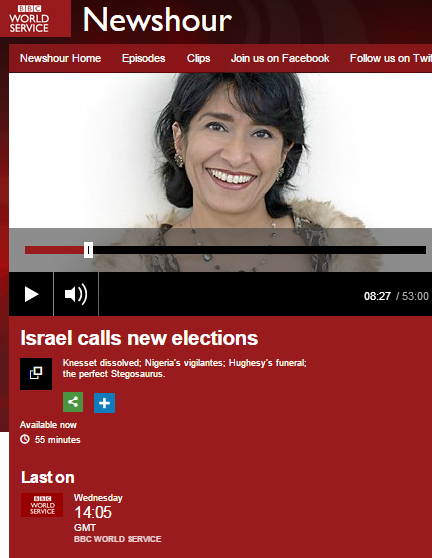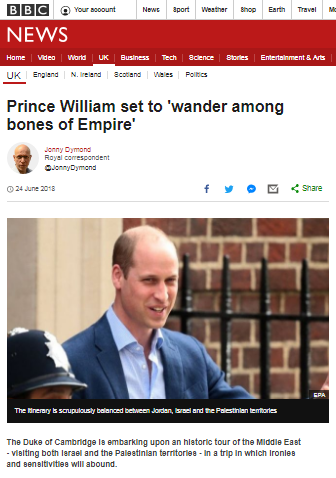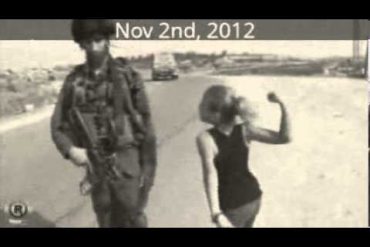On July 31st the BBC World Service radio presenter Rebecca Kesby made the following remark during an interview with an Israeli politician:
“But what the Americans and others across the world are seeing on their television screens are dead civilians and they’re seeing your artillery hitting schools and hospitals and the power supply and people see that as collective punishment against the Palestinians.”
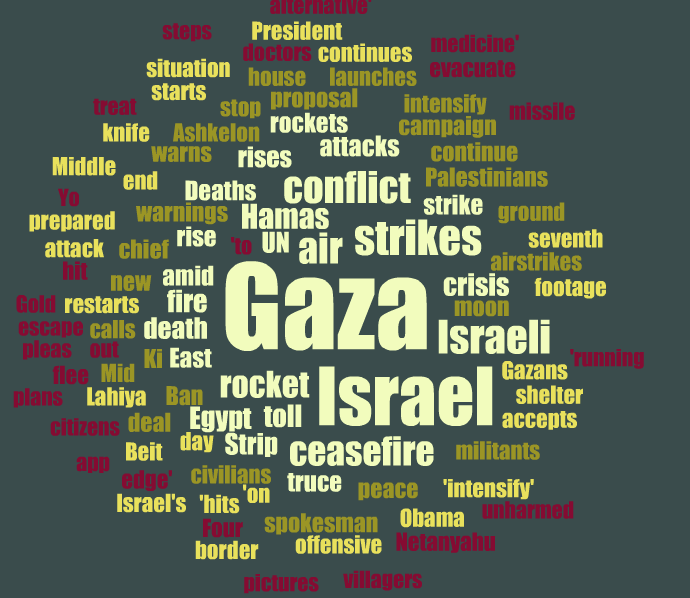
Of course what people “across the world” were “seeing on their television screens” throughout the months of July and August this year was dictated by what media organisations decided they should – or should not –see.
Over the next few days we will be taking a look at the BBC News website’s coverage of Operation Protective Edge and examining the corporation’s claims of equal coverage of the two sides of the story.
Content on the BBC News website included written news reports and written ‘Features and Analysis’ articles as well as filmed items presented as stand-alone reports and additionally often embedded into written articles. Those filmed items also appeared on BBC television news programmes and hence give us an idea of what worldwide audiences were indeed “seeing on their television screens” – as well as what they were not seeing.
In part one of this analysis we will look at the content appearing on the BBC News website’s Middle East page during the first ten days of Operation Protective Edge: from its commencement on July 8th until the beginning of the ground operation on July 17th. A small amount of content which appeared on the BBC News website at the time has since become unavailable but below are the vast majority of the reports offered to the website’s visitors. We are not including here the many reports concerning demonstrations relating to the conflict in Europe and elsewhere which appeared on the Middle East page: that topic will be covered separately.
Written: Israel launches new air strikes on Gaza Strip
Israel ‘ready for escalation’ of Gaza conflict (discussed here)
Features: Gaza conflict: Why Israeli invasion would be risky Jonathan Marcus
Filmed: Israel launches new air strikes on Gaza Strip Rushdi Abualouf in Gaza
50 strikes, 15 injuries: Israel and Gaza in 45 seconds
Israel ‘no alternative’ but airstrikes after rocket attacks interview with IDF spokesman Peter Lerner
Gaza doctors ‘running out of medicine’ to treat civilians Yolande Knell in Gaza (discussed here)
Notably, the BBC’s second written article on the very first day of the operation already promoted Hamas claims of Israeli ‘war crimes’; a theme which was to be repeated in the days to come. Also notable was Yolande Knell’s promotion of the inaccurate notion that shortages of medical supplies in the Gaza Strip were attributable to border restrictions imposed by Israel. That obviously pre-existing theme was frequently promoted in subsequent BBC coverage.
Written: Hamas fires rockets amid Israeli air strikes on Gaza (discussed here)
Israel ‘to intensify Gaza attacks’ (discussed here)
Filmed: Israel steps up plans to stop rocket attacks from Gaza James Reynolds in Israel (discussed here)
A night of Gaza rocket attacks on Israel Yolande Knell in Gaza (discussed here)
Video shows Israeli airstrikes on Gaza Strip Yolande Knell in Gaza (discussed here
‘Scrambling for cover’ in Ashkelon as tanks mass James Reynolds in Israel
Where are Gaza militants firing rockets? James Reynolds in Israel
Mid-East crisis: Israel vows to expand Gaza operation James Reynolds in Israel
Gaza death toll rises as air strikes continue Yolande Knell in Gaza (discussed here)
Hamas spokesman on restoring ceasefire interview with Osama Hamdan
Israeli adviser Dore Gold on hopes for Mid-East peace interview with Dore Gold
Day two of the operation saw further promotion of the notion of ‘war crimes’ in the day’s first written article along with amplification in both that item and a filmed report by Yolande Knell of the false claim made by a political NGO engaged in lawfare against Israel that Israeli forces were deliberately targeting civilians in the Gaza Strip. The topic of Hamas’ use of human shields – already evident by this stage – was ignored in both written and filmed reports.
Written: UN chief Ban Ki-moon: Gaza situation ‘on knife-edge’
Deaths rise in Israeli air strikes on Gaza
UN chief Ban Ki-moon pleas for Gaza ceasefire
Features: Yo app warns Israeli citizens of missile strikes
Filmed: Deaths rise in Israeli air strikes on Gaza Yolande Knell in Gaza
Israeli villagers escape unharmed after Gaza rocket attack James Reynolds in Israel
Call for calm on Gaza Israel border as death toll rises Kevin Connolly in Israel
Deaths rise in Israeli air strikes on Gaza Quentin Sommerville in Gaza
Gaza situation ‘on knife-edge’ – UN chief Ban Ki-moon press conference
On July 10th BBC audiences heard amplification of claims of ‘collective punishment’ of the civilian population of the Gaza Strip. The practice of unqualified promotion of casualty figures supplied by Hamas sources (but not verified by the BBC) was evident and continued to be so throughout the conflict. No effort was made by the BBC to establish the number of combatant casualties and the issue of Hamas’ use of human shields – including directives issued by Hamas officials to the public – continued to be ignored.
Written: US prepared to broker Gaza ceasefire, says Obama
Gaza crisis: Fresh attacks follow US ceasefire offer
Gaza crisis: Death toll from Israeli strikes ‘hits 100’
Features: In pictures: Gaza conflict escalates (discussed here)
Gaza-Israel conflict: What can Israel and Hamas gain? Kevin Connolly
Gaza-Israel conflict: ‘It’s not worth living’
Mothers in Israel and Gaza ‘want the same thing’ audio – Yolande Knell Gaza and Israel
Filmed: ‘Five killed’ as Israeli air strike flattens Gaza house Tim Wilcox Gaza
Gaza crisis: Rocket strikes Israeli petrol station James Reynolds in Israel
Israel defends Gaza military campaign Jeremy Bowen in Gaza
Gaza crisis: Death toll from Israeli strikes ‘hits 100’ Jeremy Bowen in Gaza
Amateur footage after Israeli air strike on Gaza Gaza
Baroness Amos calls for ceasefire on Gaza Israel border interview Valerie Amos
Jerusalem mayor defiant in face of Hamas rocket attacks interview Nir Barakat
The BBC continued to report casualty figures supplied by Hamas or Hamas-linked sources with no effort made either to inform audiences of the motives of the sources, to verify those figures or to determine the civilian to combatant ratio. Notably, within hours of Jeremy Bowen’s arrival in the Gaza Strip on July 11th he was already promoting the concept that “there’s serious doubt Israel is complying with the laws of war that protect civilians” and claiming that Israel had “serious questions” to answer. Bowen also began the promotion of UN casualty figures, but failed to inform audiences of the sources of those statistics.
Written: Israel to ‘resist international pressure’ over Gaza
Israel and militants trade fire as Gaza toll rises
Features: Jeremy Bowen: Israel and Hamas not ready for ceasefire (discussed here)
Filmed: Death toll rises in Gaza as air strikes and rockets continue Yolande Knell in Gaza
Israel-Gaza conflict: Home for disabled hit in Beit Lahiya Jeremy Bowen in Gaza
Israeli strike on disability shelter in Gaza’s Beit Lahiya Yolande Knell in Gaza
Israel ‘will do what it takes to stop the fire of rockets’ interview with Mark Regev
One of the notable themes appearing on this day (as well as in subsequent BBC coverage) was the depiction of the missiles used by terrorists in the Gaza Strip as “homemade rockets“.
Written: UN calls for Israel-Gaza ceasefire
Gaza: Israel hits security HQ and rocket site
Filmed: Israel warns north Gaza civilians to evacuate ahead of strikes Yolande Knell in Gaza
Gaza hit by Israeli shells Gaza
Israel’s Iron Dome intercepts rockets fired from Gaza Israel
Fleeing Gaza families take shelter at UN school Yolande Knell in Gaza
Again, the topic of Hamas’ use of human shields and directives issued by Hamas officials instructing civilians to stay in their homes despite Israeli warnings was absent from the emotive coverage of the conflict’s impact on the civilian population of the Gaza Strip.
Written: Thousands flee northern Gaza after Israel warnings (originally published on July 13th and discussed here)
Israel’s Gaza campaign in seventh day as rocket fire continues
Features: Life in the Gaza Strip (updated version of a feature originally published in 2012)
Filmed: Middle East conflict: Palestinians flee Israeli air strikes Yolande Knell in Gaza
Israel-Gaza conflict enters seventh day Jeremy Bowen in Gaza (discussed here)
Death toll mounts amid Gaza strikes Jeremy Bowen in Gaza (discussed here)
Israel continues Gaza campaign Quentin Sommerville in Israel
Why has Israel-Gaza conflict flared? Paul Adams
July 14th saw not only continuation of the BBC policy of ignoring Hamas’ use of human shields, but active denial of that policy on the part of Jeremy Bowen. In addition, Bowen continued to promote claims of Israeli ‘war crimes’ and ‘crimes against humanity’ made by the head of a political NGO engaged in anti-Israel lawfare.
Written: Egypt proposes Israel-Gaza ceasefire
Israel accepts Egypt proposal to end Gaza conflict
Gaza conflict: Israel restarts air strikes amid rocket fire
Features: Hamas and Israel step up cyber battle for hearts and minds
Filmed: President Obama urges peace in Gaza Strip press conference
Hamas spokesman says Egypt truce plan is ‘like an ambush’ interview with Sami Abu Zuhri
Israel spokesman: Hamas threw away chance of a ceasefire interview with Mark Regev
‘Essentials, not luxuries’ being bought in Gaza Yolande Knell in Gaza (discussed here)
Israel accepts Egypt proposal to end Gaza air strikes Yolande Knell in Gaza & James Reynolds in Israel
Palestinians reject Gaza ceasefire proposal Yolande Knell in Gaza (discussed here)
Netanyahu: Prepared to ‘continue and intensify operation’ press conference
Gaza conflict: Strikes will ‘intensify’, says Netanyahu press conference
Gaza-Israel ceasefire deal proposed by Egypt Simon Clemison
Gaza conflict: Anger at scene of Hamas rocket attack in Ashdod James Reynolds in Israel
Israel to ‘intensify’ Gaza air strikes as Egypt truce fails Jeremy Bowen in Gaza
Gaza conflict: Israel restarts air strikes amid rocket fire Quentin Sommerville in Israel
Gaza Strip residents give their views on ceasefire Lyse Doucet in Gaza
The issue of Hamas’ use of human shields continued to be ignored, despite visual documentation of the practice by the BBC. The topic of “tight border restrictions” was again promoted without provision of the context necessary for BBC audiences to comprehend why those restrictions came about and their roots in Hamas terrorism. Unqualified promotion of Hamas-supplied casualty figures continued.
Written: Israel warns Gazans to leave homes as air strikes continue
Features: Crowley: Israel and Palestinians increasingly disillusioned
Filmed: Middle East crisis: Gaza house destroyed after Israeli warnings Jeremy Bowen in Gaza
Gaza-Israel conflict: Smoke rises over Gaza Yolande Knell in Gaza
Gaza-Israel conflict: Four boys killed on beach by rocket fire Lyse Doucet in Gaza (discussed here)
Gaza-Israel conflict: Peace deal still possible, says Arab League Orla Guerin in Cairo
Gaza-Israel conflict: BBC assesses the mood in Ashkelon James Reynolds in Israel (discussed here)
Israeli air strike warnings: What the footage tells us (discussed here)
By this stage the BBC’s promotion and amplification of the PR messaging of political NGOs had been extended to include B’Tselem as well as the PCHR and UN OCHA.
Written: Gaza ceasefire between Hamas and Israel begins
Israel-Gaza ceasefire deal denied (discussed here)
Three charged over Palestinian Mohammad Abu Khdair murder (discussed here)
Features: #BBCtrending: The rise of Hitler hashtags
Why Egypt remains key to Gaza-Israel truce
Filmed: Israeli president ‘sorry’ over four child deaths in Gaza interview with Shimon Peres
Gazans flock to banks and shops during brief ceasefire Yolande Knell in Gaza
Israel starts Gaza ground offensive Quentin Sommerville in Israel (discussed here)
Israel starts Gaza ground offensive Quentin Sommerville in Israel
Gaza crisis: New exchanges of fire after truce ends Lyse Doucet in Gaza
‘Journalists told to evacuate hotel’ – Paul Adams in Gaza
Notable in the second written article on this day was the disappearance of Hamas’ breach of a ceasefire and the downplaying of the cross-border infiltration into Israel by Hamas terrorists which made a ground operation inevitable.
Between July 8th and July 17th the predominant type of content presented to visitors to the BBC News website’s Middle East page was filmed reports from the Gaza Strip, with the majority of those items concentrating on what can only be described as emotive coverage of the conflict’s impact on civilians. Hamas spokesmen were interviewed on just two occasions (in contrast with four times as many interviews or footage from press conferences with Israelis) meaning that the focus of BBC reporting remained on the civilian population of the Gaza Strip. The total number of filmed reports describing the situation in Gaza during those first ten days of the conflict was more than double the number of filmed reports describing the situation in Israel.
Within the first few days of BBC coverage of the conflict, certain themes became apparent. Just hours after the operation commenced the BBC had already introduced the topic of ‘war crimes’ into its coverage and that theme and similar ones such as ‘crimes against humanity’ continued to be promoted; particularly by means of generous amplification of the messaging of selected political NGOs. The speed with which the BBC adopted that theme – along with the lack of any attempt to provide factual evidence that the use of such terminology was justified – does not encourage the belief that the corporation’s foreign correspondents arrived in the Gaza Strip free of preconceived political views.
An additional theme promoted right from the start of BBC coverage of the conflict was that of the supposed deliberate targeting of civilians by Israel – described on numerous occasions in the Hamas-style terminology ‘collective punishment’. Whilst BBC audiences were shown ample footage and images of destruction and casualties in the Gaza Strip (including graphic filmed reports from hospitals and morgues) the subject of Hamas’ use of the local civilian population as human shields was ignored and even denied. Also noticeable was the BBC’s failure to carry out any discernible independent verification of the casualty figures and ratios supplied by Hamas and Hamas-linked sources, yet unquestioningly and vigorously amplified by the BBC.
Whilst BBC compliance with Hamas restrictions placed on the foreign media throughout the conflict (for example, refraining from filming Hamas terror operatives) was all too apparent to those with additional sources of knowledge and information, general audiences were not informed of that factor either during the conflict or since (in contrast, for example, to BBC statements concerning restrictions on reporting in Iraq in 2003) meaning that they would naturally conclude that all BBC content presented a freely reported, accurate and impartial picture of the situation on the ground upon which they could rely as a source of knowledge and understanding and use to reach informed judgements on the issue.
The BBC’s adherence to Hamas messaging, its advancement of pre-existing politicised themes and its heavy focus on the promotion of context-free emotive images of civilian suffering in the Gaza Strip meant, however, that the story was being framed in a very specific way already from the opening hours and days of coverage.


